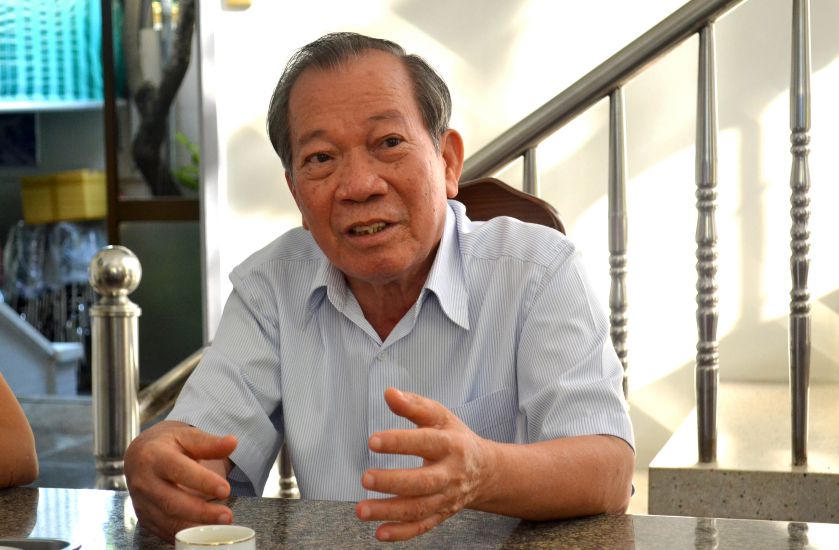Holding a light running in front of a car
In March 1988, when appointed as Director of the An Giang Department of Agriculture, Mr. Nguyen Minh Nhi took a breakthrough step, creating an unprecedented agricultural extension model in Vietnam. Like other Departments of Agriculture across the country, An Giang implements the program "transfer of agricultural scientific and technical advances" piloted by the Ministry of Agriculture.
However, Mr. Nhi found that this method was too "forested" and the procedures were cumbersome, making it difficult for farmers to access. He began to find ways to innovate. Inspired by the lessons in promoting farming in "Uncle Tam's Family Program" on Saigon Radio Station - easy to understand, easy to do without many direct instructions, Mr. Nhi came up with a new method of promoting farming. Through reputable organizations or State agencies, we convey scientific knowledge to people in an easy-to-understand and easy-to-apply to production practices - Mr. Nhi shared.
However, to realize this idea is not easy. At that time, the Central Government did not have a specific policy, while the provinces did not determine the time. Therefore, I had to do it secretly" - Mr. Nhi recalled.
After consulting with many experts, especially Prof. Dr. Vo Tong Xuan - Vice Principal of Can Tho University - at that time, Mr. Nhi received support and a commitment to support scientific information. He decided to commit. I dont think that in the future I can be praised for daring to pull the fence or for any beauty. All action is based on the desire to provide practical support for farmers" - Mr. Nhi shared. Determined to work in accordance with his beliefs, he decided and was ready to take responsibility: "If there is criticism, I will take responsibility myself, not let anyone, including colleagues, be involved."
At the forum summarizing 20 years of Vietnam's agricultural promotion work (1993-2013), with the participation of Associate Professor, Dr. Mai Thanh Phung from the National Agricultural Extension Center, speakers unanimously recognized An Giang as the "capital of agricultural promotion".
Secret work and big results
Without documents, without propaganda, I work as a farmer for the farmers house - Mr. Nguyen Minh Nhi started the story of agricultural promotion more than 35 years ago.
First, he had black boards with roofs and nets covered to serve as places to post agricultural information for communes and towns. Every month, the Department of Agriculture issues "agricultural Novembers" to agricultural promotion stations and clubs. To operate the system effectively, Mr. Nhi has carried out an organizational revolution, requiring the Provincial Party Committee to allow the reform of agricultural organization and personnel at the grassroots level.
He recalled that previously, the Commune Agricultural Committee was headed by the Vice Chairman of the Commune People's Committee but lacked technical staff. Realizing this loophole, he reduced the district-level payroll, sending technical staff to the commune, each commune unit had 2 professional staff. Although many people initially doubted him, he was still steadfast in the principle: "Learn what you don't know and if you work with a heart for the people, you will overcome any difficulties".
He not only learned from experts but also listened to practical needs to build an agricultural promotion program. On November 2, 1989, he decided to invite more departments of health and banks, adding contents such as "planned birth" and "bank loans" to easily gather people to participate. He also invited the staff of the institute and school to report on the topic of extreme weather and new varieties.
As soon as it was launched, the An Giang farmers' promotion program had to face the brown-throat disease challenge in 1990. Brown mud is rampant, people do not know how to handle it, in some places they even use bamboo shoots dipped in fish sauce to sprinkle on rice plants.
Mr. Nhi directed the mobilization of police, military forces, Youth Union and agricultural officers of the commune to spray pesticides to kill brown moss in the rice fields of the Khmer people in Tri Ton and Tinh Bien. For the remaining localities, he requested the Plant Protection Department to prepare documents guiding the use of special medicines.
When checking the documents, he discovered that he had listed too many drugs and requested an edit, only listing Bassa because it was available on the market, to avoid causing trouble for farmers. He learned an important lesson: leaders must listen and make wise decisions.
Thanks to this bold decision, while neighboring provinces suffered heavy damage, An Giang achieved a yield of nearly 1 million tons of rice. There is a shortage of Bassa drugs, he directed the import of them quickly and distributed them at the right prices, earned a profit of 1 billion VND, allocated 500 million to the budget, and rewarded the rest to the participating individuals. This decision not only saves rice but also contributes to the establishment of a national agricultural incentive system in 1993.










